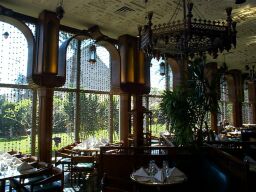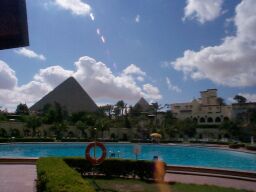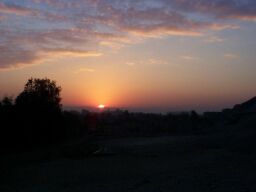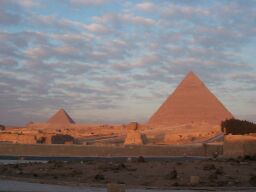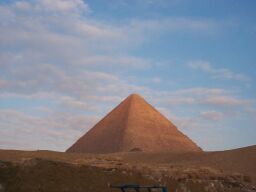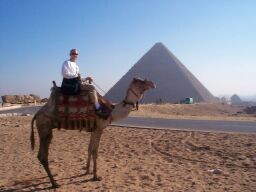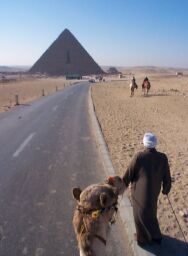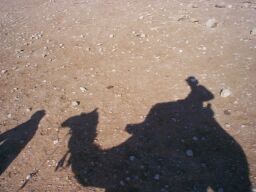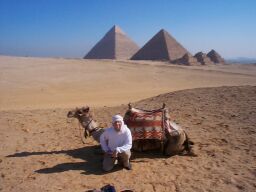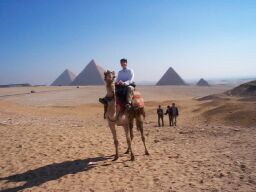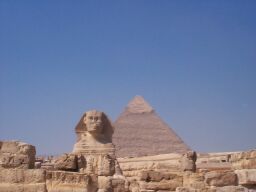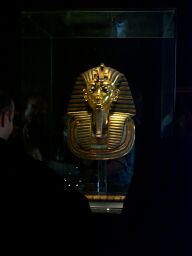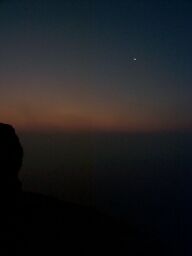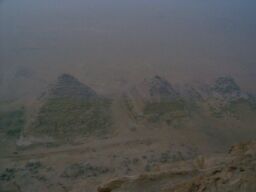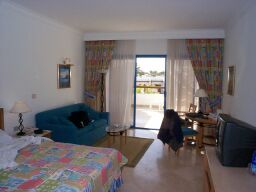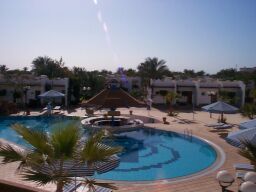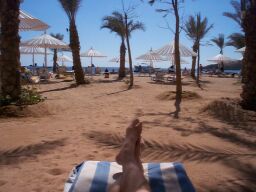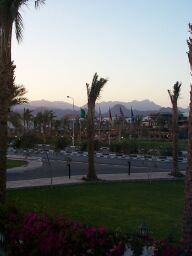|
|
2001 February Trip - Egypt
Seven days in Egypt.
Arriving in Cairo (16 Feb)
Doing Nothing (17 Feb)
The Pyramids at Dawn (18 Feb)
The Giza Pyramids (18 Feb)
To Downtown Cairo (18 Feb)
The Egyptian Museum (18 Feb)
Climbing the Pyramid of Mycerinus (19 Feb)
Old Cairo (19 Feb)
The Nile Cruise (19 Feb)
Reading Mahfouz (20-22 Feb)
Getting a Car (22 Feb)
Driving to Sharm el-Sheik (The Sinai at Night - 22 Feb)
Sharm el-Sheik (22 - 24 Feb)
To Cairo (24 - 25 Feb)
Comments
Arriving in Cairo (16 Feb)
After a short flight, we landed in Cairo. I was expecting a large International
airport, ala Charles deGaulle or New York. Instead, the airport was about the
same size as at Tunis, and somewhat more decrepit. After a lengthy and
confusing visa procedure, I expected to find myself in the main part of the
airport. Instead I was dumped on the street. Passengers milled about
uncertainly. I didn't see any taxis.
Once again I had arrived in a new country, a new city, at night, and so I found
it difficult to get my bearings.
As I moved out of the airport, I was constantly pestered by "tour guides," young
men who would ask everyone if they had a hotel, had an itinerary, wanted to
arrange camel rides, Nile cruises...
I blew most of them off, but I needed local currency and a taxi. Finally when
one tour guide approached me I asked him where I could find an ATM machine. For
him, the lack of a direct denial was akin to agreeing to use his services. He
happily redirected me to the ATM machine. It was back around the side of the
airport, through a security entrance to the departure lounge--hardly obvious.
It's an uncomfortable feeling for me, walking around a new and unfamiliar
country without any local money. Once I have enough money for taxis and food, I
relax immediately.
So after withdrawing some cash, I was readier to deal with my eager young tour
guide. I was vague about using any of his services, but I let him lead me to
"his car." It was a small beat-up white sedan, with three Egyptian men in it.
The driver was a huge older man who looked as if he never left the wheel, or if
he did it was only to buy some dubious newspapers--certainly never to bathe or
wash his clothes. The second was a young man, fashionably dressed, who was
constantly running around the car with his cellphone. He seemed to act as the
liaison between the tour guide and the driver, so I dubbed him "the liaison."
He ran around, fussing with my bag and generally calming the driver and tour
guide as they argued about something in Arabic--presumably the tour guide's cut
of my cab fare.
The third man just sat in the back seat without saying anything, I named him
"Silent Bob."
The driver and tour guide agreed to something, money exchanged hands, the
liaison hopped in the back seat, and with a final wave to the tour guide, we
sped off into Cairo.
An odd thing about driving at night in Cairo is that no one uses their
headlights. People use their parking lights, and only flash their headlights to
let other drivers know they're there. Many cars and trucks compensated for this
by adding small extra lights to their front grill and rear mud flaps.
The way dark cars with multicolored lights, and dim forms of people, moved
through the dust, backlit by the occasional approaching car with its headlights
on, reminded me of scenes from "Close Encounters of the Third Kind."
As we drove down the highway, I asked myself for the first time: what are close
encounters of the first and second kind? I saw the film when I was young and
never questioned the title. You'll be relieved to know that I figured it out in
the end.
We pulled off the highway, well short of the hotel. We drove down (this portion
of the highway was elevated), into a strange world, still dark and dusty, but
now many cars were parked beneath the pillars of the highway, throngs of
Egyptian men in robes milling around in the street. As we drove slowly through
the crowd, flashing our lights and honking the horn to get people to move out of
the way, I thought of the silent subterraneans in CS Lewis' "The Silver Chair."
The driver and liaison were debating something in Arabic. I had to guess at
their conversation:
"Shall we kill the American now?"
"Now, it's too crowded here. Go a bit further."
We drove on, now through a night-time market. Streams of dark traffic merged
and separated with honking and flashing lights. People walked by, in Western
and Arabic dress, dodging cars, holding groceries, clothing, chickens.
At this point, Silent Bob joined in the conversation.
"As the hitman, I want 50% of his cash."
"You only wanted 40% last time."
"Yeah, but that time I used a gun. This time I'm going to use my Ginsu knives,
it's more difficult."
It became apparent that Silent Bob was in fact giving directions. He was a
paying customer, just like me.
We finally turned down a small street, jammed with traffic. No cars were
moving, but the driver managed to move through the gaps, until we reached a
point where we could go no further. Pedestrians moved back and forth, vendors
sold fruit and handbags, while the vehicles were stuck in gridlock.
Silent Bob and the liaison conversed quickly, and then got out. I guess Bob
thought it'd be easier to walk from here. The liaison helped him get everything
out of the trunk, Silent Bob paid and walked off, and now we had to deal with
the gridlock.
"Old Cairo," said the driver, gesturing around us, acting the tour guide.
"Oh," I said, "great."
At this point the liaison really earned his pay. He ran back and forth
frantically, helping the driver execute a six-point turn so we could turn
around, and yelling at other drivers to give us the precious few inches we
needed to extricate ourselves.
Finally an opening appeared, and the driver took off. The liaison ran after us,
hopping in the back seat while the car was accelerating. He laughed and shook
his head, I suppose that was unusually rough, even for an experienced Cairo taxi
liaison.
We got back on the highway, headed for my hotel. The kinetic dance of unlit
vehicles moving around in the dark was a welcome change from being stuck in Old
Cairo gridlock.
As we drove, the taxi driver tried to convince me to change hotels.
"Is too much," he said.
"No."
"You know how much they charge per night?"
"No," I lied.
He told me. I was impressed--he quoted the correct rate. I thought he might
try to inflate it, to scare me.
"No thanks."
"Okay," he finally said.
My hotel was frightfully expensive by American standards, and simply unreal by
Egyptian standards. I had debated with myself for several days, but in the end
decided to splurge. My stays in Istanbul and Tunisia had all been below my
budget, and I'd be staying with family in Oman. Cairo would be a real vacation,
seeing sights but also spending a lot of time doing nothing.
Plus the hotel was across the street from the Pyramids. The guidebook listed
seven "must-do" activities, the hotel featured in two. And you could see the
Pyramids as you lay on your back, floating in the pool.
We finally arrived. Both the driver and liaison got out with me--they were
obviously excited about the payment.
They weren't disappointed. I didn't have any small bills (a common problem for
the traveller), so the ride and tip came to over $25. The drive was all the way
across town and then further to the Pyramids, even so I paid around 30-40% more
than I should have. Driver and liaison left with the sort of unalloyed goodwill
that comes only from severe overpayment.
The Pyramids towered over me, floodlit in the dusty night sky. I looked at
them, took a deep breath, and plunged into reception.
The driver and my guidebook were both out-of-date: rates had gone up by over
20%. Five nights, in the cheapest available room, would total more than my
monthly mortgage payment.
I tried haggling. But they wouldn't budge.
In the end, I capitulated. It's only money. That will probably be my epitaph.
Or at least my defense in bankruptcy court.
It turned out that the kind of room I wanted (cheapest with a Pyramid view) was
unavailable. They bumped me up to "the Palace" quarters for no extra charge.
The room was beautiful. As I was unpacking, a flurry of servants came through,
turning down the bed, showing me the various services available, leaving a large
basket of fruit and a tray of cookies. What's a couple of mortgage payments
anyway?
I went to bed and slept a long deep sleep, dreaming faintly of bongos.
Doing Nothing (17 Feb)
The next day, Saturday, I decided to do nothing at all. I wandered out just to
take a peek at the Pyramids. In the hundred yards I walked, I was approached by
countless taxi drivers and camel ride salesmen.
I took some pictures, then walked back to the hotel. I decided to just spend
the day doing something fun and relaxing. I had no books to read (I had
finished Umberto Eco's excellent "How to Travel with a Salmon" and given it to
Smith in Tunis). I had a number of software projects on the back burner, now
was the time. I sat beside the pool, beneath the Pyramids, and programmed on my
laptop. I also did a fair amount of writing.
I went to bed early: I wanted to catch the Pyramids at dawn.
The Pyramids at Dawn (18 Feb)
And so, early Sunday morning, off to the Pyramids I went. It was around six
o'clock, the sun was just about to come over the horizon.
An extremely dirty man tried to entice me down into the camel pits. I waved him
off. I continued on to the Pyramid grounds. Now a tourist policeman stopped
me.
"Is closed, sir."
The were stopping me only a few yards out of the hotel. I couldn't believe that
this was as close as you could get.
The dirty man beckoned to me again.
"This way, quickly!"
I wasn't getting anywhere with the tourist police, so I followed him. We ran
through the camel pit, passing groups of men hunched in tight circles, driking
tea in the early light.
"This way, look!"
The sun was starting to appear over the horizon. Ahead, my dirty guide was
leading me to a break in the wall around the Pyramid complex. We climbed over
the scattered stones, then stopped. Above, high on the slope, a bored tourist
policeman watched us from astride a camel.
I took a few pictures, but on the whole it wasn't a great viewpoint. I walked
back to the hotel, the dirty guide pestering me the whole way about camel rides.
As I was about to cross into the hotel grounds again, a taxi driver approached
me.
"Sir, I can take you to the Sphink-es. Very good at sunrise. Very quick.
Fifteen pounds."
Well, why not? I climbed in his taxi, and off we went.
It turned out the Sphinx entrance was just around the block. Taking the taxi
was far quicker, but 15 pounds was overly generous. Oh well.
The taxi driver was Mahoud. An associate of his, Mohammed, took me into the
complex a little ways.
This was the first time I'd seen the Sphinx, or the Pyramids from this angle.
As other writers have noted, it's smaller than you expect. But it was
nonetheless a timeless legend, and it looked straight into the morning sun.
I took some pictures. Mohammed took some pictures of me. People loved taking
my picture--it was another favor to account for when the matter of payment came
up later.
Mahoud and Mohammed were delighted to make my acquaintance. I was a foreigner
staying in a ridiculously overpriced hotel. God only knew how much money they
could extract from my naive hands. They threw all the usual pitches at me: let
them take me to Saqqara, let's got to the Papyrus Factory, you're a friend so
you'll get half-price. And so on.
They would have disappeared from my memory completely, along with the countless
other touts I'd met, except that as I was leaving they made me a final
proposition.
"You want to climb the 3rd pyramid?" That was the pyramid of Mycerinus. "We
can take you."
A brief digression is called for (and even if it's not called for, you're getting
hit with a digression anyway), the subject being an utterly forgettable book:
"The Fingerprints of the Gods." It was recommended to me by friends whose
opinions I respected, so in spite of its dubious reputation I ploughed through
it.
It's a hodge-podge of pseudo-science, quack theories arranged so as to "prove"
the author's hypothesis. He stated that every twenty thousand years or so, the
crust of the Earth would slide incredible amounts. Polar regions would move to
the equator, and vice versa. In addition to the massive short-term earthquakes,
there are obvious long-term climatic shifts. Civilizations are destroyed. The
author further claimed that the Pyramids at Giza, as well as Aztec and Mayan
temples in South America, were constructed by ancient, advanced civilizations as
a warning to us.
The author used a number of common abuses of logic to construct his arguments.
Proof by anecdote was everywhere. Another common tactic, when faced with
interesting archeological evidence (such as alignment issues, erosion, etc.) was
to supply a list of absolutely ridiculous possible causes. The most ridiculous
would be elimited by their being completely and obviously untenable, leaving a
final ridiculous cause as the "sole remaining possibility." The goal was to
provide the framework of a reasonable argument, so that the author's ridiculous
assertions appeared inevitable. But of course, by simply ignoring more likely
causes such as coincidence or statistical variation, the author hadn't really
proved anything at all.
After reading through a large part of the book, I became convinced that the
author knew what he was doing. The author, I am sure, didn't believe his
conclusions any more than I did. But he carefully constructed fallacious
arguments, repeatedly applying the same patterns, because he knew it would sell.
To me, that was particularly reprehensible.
There was only one part of the book that I found enjoyable. That was his
account of "field research," where he would go out and visit the pyramids in
Giza or South America.
And to bring the digression to a close, he described his experience of paying a
guide to take him up to the top of the Great Pyramid at dawn. I always
remembered that.
So when Mahoud and Mohammed offered to take me to the top of a pyramid, I
agreed. A part of me knew that this was not ecologically friendly tourism, but
the thrill was too hard to resist. I promised to meet them at 5 the next
morning.
Mahoud took me back to the hotel, still pitching trips to Saqqara or the Papyrus
Factory. Every cab ride was like this.
The Giza Pyramids (18 Feb)
I relaxed at the hotel for a while, then headed back to explore the Pyramids,
now that the site was open.
I walked around the outside of the Great Pyramids, picking torturous routes so
that the hordes of camel guides had trouble following me.
I decided to climb up the hill to the east, for a good view. I stopped at one
point to look around. A friendly camel guide, on a healthy-looking camel,
stopped and asked me if I wanted a ride through the complex. He quoted a
reasonable price. And I was tired of walking.
"All right."
The guide's name was Ali, the camel was Calambis. Ali walked most of the way,
leading Calambis and I.
It was a beautiful day, clear and cloudless. Even though it was morning, you
could feel heat from the sand.
Ali led me down, through to the 3rd pyramid, talking all the while about their
construction. His narative wasn't much more descriptive than my guide book, but
his language was far more colorful.
After walking around for a while, we climbed up the hill to the east, with
throngs of other tourists. Then we moved on down to the Sphinx. Now Ali rode
with me on the camel. Since he had given his spiel on the Pyramids, and he
could speak more quietly, he stopped giving archeological information and
started describing groups of tourists he'd worked with recently.
He mimicked the tourist accents. Japanese, Americans, the French, the English--
no one escaped his high-spirited sarcasm. He even started gently mocking other
tourists we passed. Calambis didn't appear to care or even notice.
As much as Ali mocked the tourists, he treated Calambis with respect.
Ali dropped me off by the Sphinx. I gave him a great tip--after all the amazing
sights in Istanbul and Tunisia, I was starting to become immune to even the
most impressive archeological ruins. Ali's narrative kept it interesting.
Ali thanked me, then went back on Calambis to tease an elderly German tourist
we'd passed, carefully taking pictures on a tripod-mounted camera.
I joined the swarms of other tourists at the base of the Sphinx, then made the
long walk through the complex, passing by the Great Pyramid once more, on my way
back to the hotel. I didn't go into any of the Pyramids--I'll save that for
next time.
After a lunch buffet at the hotel (which I noticed afterwards cost me $30), I
headed into Cairo. I was looking for bookstores.
To Downtown Cairo (18 Feb)
I hailed a cab outside the hotel. The driver, Saladino, was a huge friendly man
who didn't pester me overly with pitches for Saqqra or papyrus. He seemed more
interested in talking to an American. Like Mahoud in Tunisia, he was able to
list a good number of the most recent American Presidents.
He asked me who my favorite President was. That threw me. Reagan and Clinton
stand out in my mind as two who will be most remembered by posterity, but I'm
not a raving fan of either. I chose Clinton, which seemed somehow heretical.
Saladino didn't seem to have a strong opinion either.
I turned the tables on him, and talked about his country. I knew every single
one of the Egyptian Presidents.
Of course, there have been only 3.
My favorite Egyptian President was Sadat, only because of what I knew of him
through Kissinger's memoirs. I've heard many Arabs disliked Sadat, feeling he
sold out their cause by making peace with Israel (to be fair, he made war with
Israel first, but I guess peace is far more abhorrent to some).
So I asked Saladino what he thought of Sadat.
"I think he is the best one," he said without hesitation. I agreed.
Saladino also had high opinions of Tunisian women.
"Very beautiful, yes?"
"Oh yes." Tunisian women were indeed stunningly beautiful in my opinion.
However, to an American eye their North African and Mediterranean blend gave
them a sense of exoticism that biased judgement.
"Easy sex, yes?"
"What?" I was sure I'd misheard.
"Easy sex, yes?"
"I have no idea." Travelling alone was occasionally--rarely--lonely, but I
didn't think I'd even *seen* a prostitute in Tunisia, much less felt the need
for one's services.
"You didn't try?"
"No."
"Is very good. Very dangerous," Saladino intoned sageley. "AIDS."
"Yes."
Saladino went on for several minutes on some of the dangers of unprotected sex.
I hoped he was just warning me, and not speaking from experience. He finally
dropped me off at the center of Cairo, and I walked off in search of books.
The guidebook recommended the American University at Cairo, so I went there. A
number of guards were checking IDs at the gate, but they just waved me in. So
there are some advantages of being an obvious foreigner.
I didn't see anything at the bookstore I recognized, so I took some chances.
"Darwin Among the Machines" by Dyson, and "El Alamein" by Carver. After reading
Sagan's book I was in the mood for more twists on evolution, and since I was in
Egypt it seemed like the perfect time to learn more about Montgomery's victory
there.
I didn't think my book hunt would be successful, after my lack of success in
Istanbul and Tunisia. But I had two books in my hands, and plenty of time to
kill in the afternoon. So I went to the Egyptian Museum, even though my master
itinerary didn't have it listed until the next day. I was feeling rebellious.
The Egyptian Museum (18 Feb)
The guidebook warned me that you needed at least 36 hours to see everything.
The gardens were full of authentic statues and obelisks, many several thousand
years old. Tourists were everywhere. So when a well-dressed Egyptian proffered
his services as a guide, I accepted readily. He noted that the museum closed in
less than two hours, and mopped his brow.
"We have a lot to do."
"It's okay, I can come back and see more another day."
"We have a lot to do."
He took me inside, and started the tour. I'd read the guidebook's condensed
history of Egypt several times, and it was fresh in my mind. At a few points I
was able to fill in the names of rulers and famous Pyramids, this impressed him.
"You know a lot about ancient Egypt."
"Well, you know, they don't call me Dr. Egypt for nothing."
Actually, I didn't brag. But I didn't tell him how ignorant I was, I thought
maybe the illusion that I knew something might keep him honest, or even throw me
a few tidbits he didn't tell the average, non-ancient-Egypt-expert tourist.
The guide, Haiba, was excellent. Ali hadn't given me much information on his
tour of the Pyramids, but his personality made up for a lot. Haiba preferred a
drier delivery, but his wealth of knowledge was amazing. He
claimed to have been a curator at the museum prior to his retirement. You can
never tell when guides or touts claimed any sort of authority. Often people
would claim that they "worked there," wherever that was. Or they would say
they worked for the government. Or they would say they worked at your hotel.
But I believed Haiba.
He could read hieroglyphics, and he taught me as much as it is possible to teach
the ignorant. I can now tell which direction to read, and what a cartouch is.
Haiba would run through the inscriptions on tombs, reading aloud what they said.
Haiba had all of the dynasties memorized. He could tell you which kings and
queens came from where. He knew the significance of every symbol inscribed on
a statue. It was actually a little overwhelming.
We moved through the ancient, early dynasties of Egypt, into the age of the
pyramids. The prime exhibit, of course, is the Tutankhamen relics. I won't
bore you with the details. But they were definitely worth seeing in person.
For his and other tombs, there were detailed drawings of how the tombs were
found, and how everything was stored.
From there we walked on, through mummies and papyrus. We passed more statues
and relics of the Old and Middle Kingdoms.
Finally, the museum guards kicked us out. Haiba gave me his card, and told me
I was free to call at any time with questions about Egyptian history. Did he
really think I was going to call him at 2 in the morning and ask him who
succeeded Hatshepsut? But I guess you never know. I kept his card, if I go back
I'll call him again.
I found myself back on the crazy streets of Cairo, at 5 o'clock. I didn't want
to fight the traffic to get back to the hotel in time for the Sphinx sound and
light show. It all sounded a bit overwhelmingly touristy. So I decided to eat
dinner there in Cairo.
Cairo has one, count it, one vegetarian restaurant. So I went there:
L'Aubergine. If you're a meat eater, you'd have been as bored there as I am at
steak houses. For me it was great. It was easily the best meal at a restaurant
I had on the entire trip.
After that I made my way back to the hotel, and to sleep. I had to get up early
again, this time to climb the Pyramid of Mycerinus.
Climbing the Pyramid of Mycerinus (19 Feb)
The wake-up call came in at 4:30. Very early. I lay there in bed, debating
whether I was really going to do this or not, then finally motivated myself to
go.
Mahoud was waiting for me, just outside the hotel.
"Excellent, Mr. Tom." Once you paid ridiculous sums for a pyramid climb, people
remembered your name.
We drove off to meet Mohammed. We had to drag him away from a shopkeeper, they
were arguing about something in Arabic.
Now they may have been just exchanging viewpoints on the merits of free trade.
But when two men talk loudly and passionately in Arabic, it always sounds like
a heated argument to me.
Anyway, we coaxed Mohammed into the cab, and off we went. Mahoud dropped us off
a few blocks away, and promised to pick us up later. Mohammed and I started
walking into the Pyramids complex. He nodded at the man at the gate, who let us
in without a word.
I won't tell you the exact route we took. If you go to the Pyramid complex, and
compile a list of the top three most likely places to sneak in, this would be on
the list.
It was just after 5 as we started walking on the sand. Around us, Cairo started
waking up to the dawn prayers, the muzzeins' calls echoing around us. The stars
were bright above us, but the ground was covered in a thick haze. We half-ran,
half-walked to the third pyramid. Slowly the dark and silent forms of the
pyramids appeared before us in the mist.
We moved as silently as possible, avoiding the random bits of garbage in the
sand. Any pretense at stealth was lost, however, since Mohammed had a loud,
hacking cough. As did the rest of Cairo's smokers (i.e., pretty much the entire
population).
We finally made it to the guard post at the base of the pyramid. I was starting
to worry: was this coughing, out-of-shape man going up the pyramid with me? I
didn't think he'd make it, and if he did, his coughing would give us away.
Fortunately, it was time for a change of guides. This one was also named
Mohammed, and he also smoked, but he was younger. He led me up the pyramid.
It was an easy scramble. The blocks are around two and a half to three feet
high, in many cases it was an easy step up, other times you had to swing a leg
up and then push yourself over. At one point I thought Mohammed was just
leading me up randomly, so I set out in parallel to him. He winced as I made
noise on the rocks.
"Try to pick a clean stone."
So it wasn't that random after all. It turns out there was just the one path to
the top that was fairly clean.
We finally reached the summit, I forget the time but around 5:30 I think.
Mohammed asked that I keep my head down, so that the tourist police on the other
side of the pyramid wouldn't see me. We sat at the top, waiting for the sun to
come up. Mohammed smoked two cigarettes. I kept trying to take pictures, but
the low light was defeating my digital camera. The eastern sky was getting
brighter and brighter, but no sun appeared. Below us the three Queen's Pyramids
became more defined as the sky brightened and the haze started lifting.
"Where are you from?"
"America."
"I bring everyone up here. American, English, French, too many Germans."
I think he meant "a lot of" instead of "too many."
He was a geography student at college. So I asked him if he had travelled. He
looked surprised and almost insulted at the question.
"No, I am an ordinary Egyptian. I stay here and work. I want to raise a
family. I think more people should just try to be good fathers."
I wasn't going to argue with that.
The sky continued to brighten, by now the stars had disappeared and the sky was
a deep blue. Mohammed laughed.
"I think there is no sun today." It was just too hazy to see the sun. But it
was bright enough now that we could be easily seen at the top of the pyramid.
So we descended.
I tipped the young Mohammed generously, then said goodbye. The older Mohammed
and I ran back to meet Mahoud. Now that the trip was over, Mohammed started
pitching new ideas. Want to see the Papyrus Factory? Want to go to Saqqara?
Want to climb the Big Pyramid?
"No, I just want to get back to the hotel."
I paid Mohammed the agreed amount, plus some. I think he ended up deceiving
Mahoud about the amount I'd paid.
Old Cairo (19 Feb)
I returned to the hotel, and signed up for a cruise down the Nile that night.
Then I mostly killed time until noon. At that point I wandered out and
explored Old Cairo, particularly the Hanging (Coptic) Church and environs.
The guidebook had listed the Hanging church as one of the must-see items in
Cairo. I personally didn't find it as interesting as St. George's, just up the
street.
Why is it called the "hanging" church? Because it doesn't have any real
foundations. Instead, it is built on supports that are suspended between two
towers, formerly Roman towers flanking the old Water Gate at Cairo. They were
excavating and rebuilding around the Water Gate, I thought that was just as
exciting (or more) than the church itself.
St. George's was a lovely old church, built on equally lovely grounds. I
wandered around for a while and relaxed. Of course, since it was St. George's,
there were a lot of images of him slaying the dragon. That made me think of
Sagan's book "The Dragons of Eden" again.
According to Sagan, human beings have hardwired within them a fear of reptiles,
particularly snakes. I suppose that may be true. One item of evidence he
supplied was that hissing was a form of attracting attention in almost all
human cultures. Okay.
He also said our built-in fear of reptiles explains why we always have
nightmares about snakes. I had to stop at that point. I don't think I can
remember ever having nightmares about snakes. Have you? Although I might start
now that Sagan has suggested it.
After looking around in Old Cairo, I took the Metro back to Giza, and then a cab
back to the hotel. I was looking for a place to read, but couldn't find
anywhere in Cairo along the metro route. So I ended up reading by the pool at
the hotel again. I was trying to make my way through the "Darwin Among the
Machines" book--tough going.
The Nile Cruise (19 Feb)
After that, it was time for the Nile cruise. The agent at the hotel had
promised me it was well worth it. It seemed like a somewhat cheesy tourist
thing to do. But I was also looking forward to it. I hadn't really met any of
the guests at the hotel, this would be a nice way to meet at least a few.
The driver met me at 7, as planned. I looked around.
"Is anyone else from the hotel going?"
"No, just you."
Oh well. Maybe guests from other hotels were going? It's not like they would
just plop me down at a table all by myself, right?
The entrance to the boat looked like something from Disneyland. Young men and
women wore "period costumes," meaning that the Pharoahs apparently were big fans
of glitter and tinfoil. It was a three-deck boat, the bottom two were indoors
(where you had assigned seats and dinner was served), the top deck was open.
They plopped me down at a table all by myself. The nearest table was a couple
around ten years older than me who apparently spoke only Arabic. Oh boy.
A bored pair of Egyptian musicians cranked out covers of 80's pop tunes. I
thought they were pretty decent, but the crowd was more interested in eating
from the buffet. The musicians were joined later by some lounge singers, who
also had problems with audience participation.
Fortunately, the view from the top deck was beautiful. After I'd eaten a bit (the
buffet was the exact same as the hotel's lunch buffet--it was even catered by
the hotel) I went up and watched the Nile glide by. It's a beautiful river. I
suppose any city looks good at night from the water (Seattle certainly does).
Fancy hotels had carefully manicured lawns, with streams of lights. Dark palm
trees were backlit by street lights. Cars and pedestrians went over the bridges
as we went under them.
After the cruise, the driver suggested stopping at the Papyrus Museum on the way
home. When a small, dirty shop wants to sell you dubious papyrus, it doesn't
call itself the "Cheap Papyrus Shop" or "Papyrus-R-Us." Instead it calls itself
a museum or a factory. I declined the offer to visit one.
Reading Mahfouz (20-22 Feb)
I slept in the next morning, making up for the previous two nights. Originally,
I had planned to leave the next day (the 21st) for Oman. But now a problem had
come up: although I had mailed all the necessary documents back in early
January, they had yet to wind their way through the Oman postal system. So I
had no visa for entering Oman. I exchanged emails with my father there, but it
looked like a delay of a few days was inevitable.
So I decided to spend the extra time in Egypt. After my experiences in Tunisia,
the choice was clear: rent a car and drive somewhere. I decided not to go up
the Nile to Luxor, for three reasons. One, it would be crowded. Two, it would
mean exploring more pyramids and temples, and I had decided to save that until I
visited the place with someone else. Three, it was a very long drive.
So the second choice was the Red Sea. I didn't know much about the area, and I
certainly didn't know how to get there. So I headed into town to get a map.
I ended up at the Nile Hilton, which I quite often went to because it had both a
cash machine and a reasonably-priced Internet cafe. Its bookstore also had a
decent map of Egypt, and (even better) some books by Naguib Mahfouz, Egypt's
most famous author (and a Nobel Prize winner). I hadn't heard of Mahfouz before
my trip (remember, I'm an engineer, not a writer), but his name was everywhere
around Cairo. So I picked up "Arabian Nights and Days."
I decided to head to one of the nice hotels I'd seen the previous night on the
Nile cruise: The Gezira Sheraton. I sat out on its floating deck, eating lunch
and reading Mahfouz on the Nile. After I'd worn out my welcome at the Sheraton
I walked back to the Hilton, found a quiet, comfortable seat in the lobby, and
finished the book there.
It's been a long time since I finished a book in a day.
I can certainly recommend "Arabian Nights and Days" to anyone. I have a
distaste for fiction, I usually feel cheated after reading it and wonder if I
would have gotten more out of reading something "real." Mahfouz reminds you
what good fiction is.
I sat in the Hilton Lobby for a while after I'd finished, absorbing the book.
Then it was off to dinner. I wasn't particularly hungry yet, so I decided a
long walk was in order to build up an appetite. I chose a highly recommended
Italian restaurant on the far side of town. I crossed the Nile again, and was
immersed in the busy streets of the West side.
These were not tourist avenues. No street salesmen approached. Instead, I
received curious stares from Cairenes as I walked past rows of shops selling
shoes, appliances, furniture. I quickly got lost, way off the map where I had
only the vaguest idea of what the streets were. I had to backtrack almost to
the river again to recover my bearings.
I had estimated around a forty-five minute walk, but the actual total was closer
to two hours. I finally stepped into the dark restaurant, greeted unexpectedly
by Billy Ocean playing in the background--when was the last time you heard him?
I ordered an appetizer, an entre, wine. To my embarrassment, I was unable to
eat more than a few bites of the entre. Even after the long afternoon, and the
long walk, I still felt full from lunch. The confused maitre'd carefully
packaged up my food and wine for me, and I walked out and got a taxi back to the
hotel.
I found out around midnight, in the most unpleasant manner possible, that I was
*not* full from lunch--rather, I was a victim of food poisoning. As far as I
can tell, it was something I ate at the Gezira Sheraton.
I'll spare you the details. It's just as well that my Oman visa hadn't come
through, I would have missed the flight there anyway. I had to book another day
at the hotel. I spent a day and a half in the room, by the end I had no sense
of time--I couldn't tell if my watch was reading am or pm. I had weird dreams
with genies, sultans, and exotic Tunisian women in flowing purple robes. That
was Mahfouz's influence. I also dreamed of tanks in the desert, since in the
brief periods of lucidity I was getting a start on the El Alamein book. I think
I preferred Mahfouz's dreams.
Finally, late in the morning of the 22nd, I felt well enough to check out and
move on. The food poisoning had cost me much more than a day--I'd missed the
end of the Omani week, and now I'd have to wait at least two more days before my
father could tackle the bureaucracy once more.
I checked out, trying to sign all the paperwork without looking at the total.
Then I took a taxi to the airport, where I intended to rent a car.
Getting a Car (22 Feb)
The taxi driver was a young, amiable Egyptian named Hasan. He had a small book
in his taxi--a guestbook. Tourists of all nationalities had written him
paragraphs of thanks, all signed and dated. Hasan had been ferrying around
grateful tourists since at least 1998.
He was very pleasant. Perhaps because he thought I was leaving the country, he
never once pestered me about Saqqara or papyrus. I almost wished I'd met him
earlier, I may have actually taken him up on a Saqqara trip.
Hasan also had high opinions of Sadat. And he repeated over and over how much
he just wanted peace with Israel now. For a young man in Egypt with dreams of
acquiring Western-style wealth, peace was infinitely preferable to war.
By now I was used to the Cairo traffic. It was easily the craziest I'd seen
anywhere, including Rome. But on this taxi ride, I saw a future Darwin Award
winner: A large man with wild black hair and a beard, atop a small motorbike,
laughing maniacally as he drove against the flow of traffic.
He had several good-sized propane tanks slung over his shoulders.
Just before we entered the airport, the taxi died. Hasan cursed quietly in
Arabic, but pulled over quickly without much fuss.
"It's no problem. I get you another taxi. The airport is just two minutes
away, maybe five pounds fare." His English was very good, easily the best of
any taxi driver, and on a par with the better hotel staff.
Sure enough, another taxi pulled in front of us immediately to drop off a
customer. Hasan waved at it, and the driver waited while we unloaded my gear.
I paid Hasan, thanked him and wished him luck with his taxi, and hopped into the
new taxi. We drove off into the airport.
The new taxi driver started laughing.
"He is very stupid," he said, referring to Hasan. I was shocked.
"Why?"
"Nothing wrong with his car. Doesn't have permit for airport."
Hasan faked the breakdown to avoid entering the airport?
Sure enough, there were many checkpoints to get into the airport, and my new
driver had to produce all sorts of permits as well as cash.
Hasan *may* have had the permits, his taxi *may* have just suddenly quit. But I now
believe that he simply turned the engine off.
The new driver dropped me off at the airport, pretty much at the exact spot
where I'd arrived. I now had to negotiate with all sorts of very dubious-
looking characters to acquire a rental car. It was a two-person job for the
salesmen: one to talk to me, the other to restrain--literally--competing
salesmen who were trying to interrupt with counter-offers.
One man heard my destination (Suez) and shook his head gravely.
"That road is very dangerous. Very dangerous."
"Why?" I asked. All sorts of scenarios went through my head. Militant Islamic
terrorists were attacking tourists there? Problems with Israel had heated up?
Wild dogs?
"Is very bumpy road. Without driver, without Mercedes, you'll never make it."
Great. A limousine salesman was telling me I'd never make it without a
limousine. I thanked him for the advice.
I didn't see any international agencies I recognized, so I went with one of the
local agencies at random. A portly Egyptian named Ahmed, the representative of
the company I'd picked, became my personal guide at that point. He lead me
through the airport, and into the rental car bureaucracy.
Driving to Sharm el-Sheik (The Sinai at Night - 22 Feb)
The car was a beat-up, flimsy white Mitsubishi sedan, several years old. Ahmed
was apparently green at the whole rental thing, it took him over an hour to fill
out the forms. And then he wanted baksheesh. "What about me?" he asked
plaintively as I was about to drive off.
But here I was, healthy and mobile again under blue skies and a bright sun. I
felt great. I gave Ahmed a good tip and pulled out.
The steering wheel and gear shift were covered in a tar-like substance,
blackening my hands almost immediately. The windshield was so dirty that I
couldn't see when I drove into the sun. The suspension was shot. The brakes
grated anytime I used them. The airport exit toolbooth Ahmed said would cost
two pounds cost twenty. And the tank was empty, the low gas light coming on as
soon as I left the toolbooth.
I cursed Ahmed and several generations of his family for the next fifteen
kilometers, when I finally found a gas station.
The one thing I didn't want to do was get stuck in traffic in Cairo. But
Ahmed's poor directions led me straight into Heliopolis (the first suburb of
Cairo from the airport). I decided to ignore the directions. Road signs (the
few that weren't in Arabic) were also rare and occasionaly misleading. I found
the road to Suez mostly by luck.
The scenery on the way to Suez was as flat and featureless as the road itself.
Kilometers and kilometers of sand rolled past as the sun got low on the horizon
behind me.
Once I'd gotten out of Cairo, it was only an hour to Suez. The town was as
bleak as promised, but the huge ships lined up at the entrance to the canal
were worth looking at.
After a brief stop, I drove north along the canal. Up from Suez was a tunnel,
which would get me across to the east.
To my left as I drove, to the west, was more flat desert, here irrigated
somewhat from the canal.
To my right, parallel to the road was a thin strip of water colored a brilliant
blue, maybe 100 yards across. I was pretty sure it was just some sort of
irrigation channel, until I passed a superfreighter coming the other direction.
The massive ship took up almost the full width of the canal, containers piled
high on the deck, towering over me.
I passed smaller freighters, and once a beautiful wooden sailing vessel. Here
the ground was so flat it really looked as if the ships were sailing through the
desert.
I was on a small minor road--the highway was a few kilometers west. As it
approached sunset, I encountered barrels on the road, and groups of soldiers
with large mounted machine guns. They usually just waved me on with bemused
glances, but I suspected that the road might close after dark. I asked some
soldiers for directions, and they waved me west.
I found the tunnel, crossed under the canal, and headed south along the east
bank of the canal. I passed Suez again, the large ships in the harbor
silhouetted against the sunset. After the sun went down, in the twilight, the
narrow Gulf of Suez was punctuated by the lights of ships at anchor.
Then it was on, around the Sinai penninsula in the darkness. I tried following
the custom of turning my lights off when other cars aproached, but in the pitch
black of the desert, at high speed, running blind was madness. I noted that
most truck drivers didn't partake in that sort of insanity, so I left my
headlights on as well.
I pulled off at one point, just to get a look at the stars. When I turned off
the car lights I couldn't find the door handle, the dark was so complete. Once
out, as my eyes slowly adjusted, I could see the Milky Way stretching from
horizon to horizon.
I encountered many checkpoints, spots in the road where soldiers had barriers
across the road. I would pull up, the soldiers would open the gate and wave me
through. I had to wonder what the point of these were.
Sharm el-Sheik (22 - 24 Feb)
I reached my destination, Sharm el-Sheik, around 9 pm. After driving for over
two hours in the dark, featureless desert, all of a sudden I was in an oasis of
light. I saw no houses, no shops, nothing but resort after resort. I found the
hotel I was looking for, far cheaper than where I'd stayed in Cairo but
surprisingly just as luxurious.
In fact, if I'd known about this hotel in Sharm el-Sheik before, I'd have
planned a more condensed stay in Cairo, and come out to the Sinai earlier to
relax. Next time.
The next day, the 23rd, I walked around. The town was an unusual place, resorts
piled on top of each other on the edge of the barren Sinai. Suddenly I was
surrounded by tourists again. How did these people get here? I hadn't seen any
traffic (but of course, they might have arrived at a more sensible hour).
I found the shops, squeezed in alleys and makeshift malls between resorts.
You could buy stuffed toys, small kilims, t-shirts with pictures of two camels
humping. For the first time on my trip, I didn't wear long trousers and long-
sleeve shirts. The crowd, including some locals, wore shorts and t-shirts. I
walked around, and just lay on the beach for several hours.
At the hotel's beach was a small stand. Two Egyptian men handed out towels, and
had a small collection of books for the hotel guests. I donated all of the
books I'd been carrying. "What If?", "The Dragons of Eden," "Arabian Nights and
Days," "El Alamein." As far as I could tell, my additions were the only titles
in English. Later, when I was walking by, I saw the two Egyptians flipping
through the El Alamein book, looking at the pictures.
I tried again to make headway in the "Darwin Among the Machines" book. It was
disappointing.
Several years ago (ten? fifteen?), Douglas Hofstadter published an amazing book
entitled "Godel, Escher, Bach." It was an eclectic mix of the three men's
works, used as a base for the discussion of machine intelligence. Of course,
once you start talking about machine intelligence, you start getting to the
fundamentals of human intelligence as well. Hofstadter's book won the Pulitzer
prize. If you know any mathematicians or computer scientists, they probably
have read (and enjoyed) the book.
Unfortunately, it spawned a number of imitators over the years. Hofstadter's
eclectic approach was a beautiful way of presenting abstract concepts from
several different angles. Many of his imitators seemed to think that being
eclectic was itself a virtue, the more eclectic the better.
Roger Penrose was one of the more famous to enter the fray, with his "The
Emperor's New Mind," meaning of course that machine intelligence was and always
would be illusory. His theory on human intelligence was a marriage of proper
Anglican creationism and dubious quantum physics. I remember theoretical
physics graduate students at Oxford boasting about the flaws they'd found in his
theory--never anything very subtle. Penrose's book had been characterized
as a "brain dump" by one reviewer, and I agreed. I managed to make it around
two-thirds the way through before giving up.
"Darwin Among the Machines" appeared to be another in the same vein. Instead of
discounting the possibility of machine intelligence, it embraces it. The
premise (as far as I can tell, only 40 or so pages into it at this point) is
that the development of machine intelligence is almost an exact parallel to the
human evolution of intelligence. For animals (the Dysons claim), simple protein
replication occured before the appearance of DNA as blueprints. Once DNA
appeared, the haphazard process of protein replication was harnessed by genes as
a way of reproducing themselves. I'm anticipating (based on hints) that Dyson
is going to claim that software is going to act as the DNA for self-reproducing
machines. The chaotic, massively connected Internet (as well as more conventional
manufacturing processes like factories) are like the primordial
soup of protein replicators, software over time acting like DNA in harnessing
that chaos into (eventually) producing intelligent machines.
Now Dyson doesn't just come out and say that. He prefers obtuse discussions of
the origins and early debates about Darwin's theory of evolution (and many of
Darwin's predecessors and contemporaries). I see that there are some
interesting similarities between early theories of evolution and the modern
understanding of complex, evolving systems, but Dyson's love of obscure quotes
is driving me absolutely insane. "Come on, man," I want to scream at the book,
"get to the point."
"El Alamein," written in the 60's by an upright Englishman (and a Field Marshall
to boot), was far less fluid in its prose. But the author was a general, and
although I sometimes found the organizational details a little too distracting,
by God you knew where he was going. He even had maps.
On the 24th I awoke, ready for another day at Sharm el-Sheik. I figured I'd
have a leisurely breakfast, get a haircut, and go snorkeling in the Red Sea.
As I was hunting for an open barbershop, I found an Internet Cafe. I decided to
check my email, and saw that my Oman visa had come through. It was time to move
on. I ran back to the hotel, threw everything into my backpack, and drove off
to Cairo. I had to hurry if I wanted to get to the airport by sunset, so I
could return the car and arrange a flight to Muscat.
To Cairo (24 - 25 Feb)
So it was another drive through the Sinai, this time in daylight. The sun was
hot, and I (thanks again to Ahmed) had no air conditioning. But with the window
open it was bearable.
I encountered more checkpoints. This time the soldiers were more agressive. I
was asked for my passport several times. At one checkpoint, not far out of
Sharm el-Sheik, I was asked for my license. I handed it to him.
"This is not an International Driver's License." He was right, it was just my
Washington State driver's license.
"I don't need an International License, do I?" I hadn't checked, but I had a
vague idea that a valid driver's license was fine.
"You think if I came to America, I could drive with an Egyptian license?"
"Umm... I think so." I wasn't at my most convincing.
The guard laughed.
"No. You need International Driver's License."
"Oh." I wasn't sure if I believed him. I started flipping through my
guidebook.
"Did you rent in Sharm el-Sheik?"
"No, I rented in Cairo. I'm on my way back right now."
The guard considered for a few seconds, then waved me on.
"Just go."
Past the checkpoint, I checked my book. Sure enough, the guard was right, I
didn't have the appropriate license. I was subject to heavy fines if they
decided to give me a ticket.
Now the checkpoints were much more exciting. Before I found them a curiosity,
now I was a criminal trying to make my way to Cairo without being discovered.
But I wasn't asked for anything more than my passport after that.
The drive went quickly. I could see more of the interior of the Sinai, and more
of the Red Sea. There were groups of camels grazing, and several times I had to
slow down for goats on the road. Apparently the Sinai still contains land mines
as legacies of wars with Israel. My guidebook advised that I not walk off roads
or tracks.
Near Suez, I saw more large ships waiting to go through the canal. I dived into
the tunnel, and emerged to the west, now on a straight line to Cairo with the
canal behind me.
I stopped for gas. I had considered returning the car absolutely empty, but in
spite of my bad feelings for Ahmed I didn't want to screw over the next innocent
renter. I got out of the car and stretched. The attendant made a motion like
he was puttting air in the tires.
"Schmee?" he asked.
I didn't know what he meant. The tires looked fine to me. He repeated the
gesture, and then motioned that I come back over to his side of the car.
"Schmee?"
I kicked the tires on that side. They looked fine. The attendant just laughed
and waved, giving up on communication. I paid him and drove off.
Later I realized that he was asking me if I had to use the restroom. He had
been pointing me to the toilets in the back of the gas station. So I guess you
shouldn't say "schmee" in polite company.
I stopped to pick up a soldier who was waving for a ride. He spoke no English,
and I spoke no Arabic, so we said very little, except for the initial three-word
conversation where he confirmed that I was on my way to Cairo. He signalled me
to let him off just before we reached the ring road in Cairo, and I sped off to
the airport.
I dropped off the car, and was stuck once more in the chaos of Ahmed's rental
car company. Ahmed was nowhere to be found, the men lounging around in the
rental agency seemed at a loss. They brightened up when I mentioned that I had
to buy some airline tickets. The one who spoke English asked me to sort out my
flights, and then return to them. It appeared they needed some time to handle
the unusual situation of a customer returning a car.
According to the Egypt Air computers, the flights I had selected on-line didn't
exist. So the agents there found me other flights, and handed me my new
tickets. After all the problems I'd had trying to sort out tickets over the
phone, it was reassuring to work with people face-to-face. I was only to find
out later that they had given me tickets for obsolete flights.
I walked back over to the rental agency. It was now clear that they had to wait
for Ahmed to show up. They spoke to each other in Arabic, but it was pretty
clear that for whatever reason, Ahmed was in big trouble. That was fine with
me.
They gave me lessons in Arabic. How to say hello, goodbye. They taught me how
to pronounce their names. Just as I was going to insist that they just catch up
with me at the hotel, Ahmed finally appeared. Apparently they couldn't do
anything without the credit card receipt I'd left when I rented the car, and for
whatever reason Ahmed had it with him. He apologized profusely, ducked the
criticisms thrown at him in Arabic, and sorted out the mess. I was finally free
to look for a hotel.
Both hotels at the airport were full. These were very nice hotels, and by this
point I was quite dusty and dirty. I suspected that they were simply not
willing to contaminate their sanctuaries with the presence of a dirty
backpacker.
I had a taxi driver take me into town. After some more bouncing between hotels
(it was a Saturday night, for some reason all the hotels were full) I finally
found an open room at the Hotel Beirut in Heliopolis. I walked out and had
dinner at a small restaurant there, and then crashed for the night.
Comments
Post a comment
WARNING: This is a very primitive comment posting. Stick to alphanumerics only! No quotes, brackets, etc.
|
